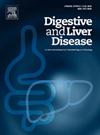Diagnostic performance of pancreatic fluid aspiration through metagenomic next-generation sequencing for suspected infected pancreatic necrosis
IF 4
3区 医学
Q1 GASTROENTEROLOGY & HEPATOLOGY
引用次数: 0
Abstract
Aims
This study aimed to evaluate the diagnostic performance of metagenomic next-generation sequencing (mNGS) with pancreatic fluid aspiration for the detection of infected pancreatic necrosis (IPN).
Methods
This retrospective observational study included 66 patients with suspected IPN. The participants simultaneously underwent pancreatic fluid aspiration mNGS, and microbial and blood culture. We compared the diagnostic performance of mNGS with that of culture in the detection of pathogens associated with IPN.
Results
Of the 66 patients, 45 (68.2 %) were confirmed to have IPN. Pancreatic fluid aspiration mNGS yielded positive results in 32 of these patients (71.1 %), significantly outperforming microbial culture results (25 patients, 55.6 %; P = 0.039); however, both methods exhibited similar specificity (95.2% vs. 100 %). The results of pancreatic fluid aspiration mNGS and microbial culture matched in 73.3 % (33/45) of patients with IPN. The turnaround time for the mNGS results was significantly shorter than that for the microbial culture method (P < 0.001). In addition, survival analysis demonstrated that a positive mNGS result was not associated with increased mortality (hazard ratio, 0.652; 95 % confidence interval 0.157–2.699, P = 0.555).
Conclusions
Our study highlights the potential of mNGS for diagnosing IPN, with implications for improving patient care by facilitating early and accurate diagnosis, guiding appropriate interventions, and possibly improving patient outcomes.
通过元基因组新一代测序对疑似感染性胰腺坏死的胰液抽吸进行诊断。
目的:本研究旨在评估元基因组新一代测序(mNGS)与胰液抽吸法在检测感染性胰腺坏死(IPN)方面的诊断性能:这项回顾性观察研究纳入了 66 名疑似 IPN 患者。参与者同时接受了胰液抽吸 mNGS 以及微生物和血液培养。我们比较了 mNGS 和培养在检测 IPN 相关病原体方面的诊断性能:结果:66 名患者中有 45 人(68.2%)被确诊为 IPN。其中 32 名患者(71.1%)的胰液抽吸 mNGS 结果呈阳性,明显优于微生物培养结果(25 名患者,55.6%;P = 0.039);但两种方法的特异性相似(95.2% 对 100%)。在 73.3% 的 IPN 患者(33/45)中,胰液抽吸 mNGS 和微生物培养的结果相符。mNGS 结果的周转时间明显短于微生物培养方法(P < 0.001)。此外,生存分析表明,mNGS 阳性结果与死亡率增加无关(危险比为 0.652;95% 置信区间为 0.157-2.699,P = 0.555):我们的研究突显了 mNGS 诊断 IPN 的潜力,通过促进早期准确诊断、指导适当干预和改善患者预后,对改善患者护理具有重要意义。
本文章由计算机程序翻译,如有差异,请以英文原文为准。
求助全文
约1分钟内获得全文
求助全文
来源期刊

Digestive and Liver Disease
医学-胃肠肝病学
CiteScore
6.10
自引率
2.20%
发文量
632
审稿时长
19 days
期刊介绍:
Digestive and Liver Disease is an international journal of Gastroenterology and Hepatology. It is the official journal of Italian Association for the Study of the Liver (AISF); Italian Association for the Study of the Pancreas (AISP); Italian Association for Digestive Endoscopy (SIED); Italian Association for Hospital Gastroenterologists and Digestive Endoscopists (AIGO); Italian Society of Gastroenterology (SIGE); Italian Society of Pediatric Gastroenterology and Hepatology (SIGENP) and Italian Group for the Study of Inflammatory Bowel Disease (IG-IBD).
Digestive and Liver Disease publishes papers on basic and clinical research in the field of gastroenterology and hepatology.
Contributions consist of:
Original Papers
Correspondence to the Editor
Editorials, Reviews and Special Articles
Progress Reports
Image of the Month
Congress Proceedings
Symposia and Mini-symposia.
 求助内容:
求助内容: 应助结果提醒方式:
应助结果提醒方式:


